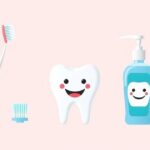Are you looking for ways to enhance your dental health? Top vitamins for stronger teeth and enamel can be your secret weapons! Many women over 30 often find themselves dealing with dental issues due to various health changes, lifestyle choices, and even stress. Often overlooked, vitamins play a crucial role in supporting our teeth and enamel, helping to combat decay and enhance our smiles. In this article, we’ll uncover the essential nutrients that can make a difference and bring back your confidence.
Understanding the Connection Between Vitamins and Dental Health
Dental health is about more than just brushing and flossing. The foods we eat and the vitamins we take play a crucial role in maintaining the strength of our teeth and enamel. Many women over 30 find themselves struggling with dental issues, whether it’s sensitivity, discoloration, or weakened enamel. It’s important to understand how vitamins can help regulate oral health and strengthen your smile.
The shiny, white sheen of healthy teeth isn’t just a cosmetic perk; it’s a sign of vitality and strong dental foundation. Vitamins work synergistically to protect teeth against decay and promote gum health. For women experiencing fatigue or hormonal changes, boosting your vitamin intake might also help balance overall body functions, including oral health.
Vitamin D: The Unsung Hero for Teeth Strengthening
Vitamin D often flies under the radar, but it’s essential for sustaining strong bones and durable teeth. This vitamin helps your body absorb calcium, which directly impacts tooth enamel health. Women, especially those over 30, require adequate vitamin D as hormonal changes can affect bone density and overall health.
Many individuals do not get enough vitamin D from sunlight or diet. Foods rich in this nutrient include:
- Fatty fish: salmon, mackerel
- Fortified dairy products: milk, yogurt
- Egg yolks: a delicious way to boost intake
- Fortified cereals: an easy addition to breakfast
Consider talking to your healthcare provider about a vitamin D test, especially if you feel fatigued or experience muscle weakness. Getting enough vitamin D is a powerful way to enhance your dental health and improve your overall well-being.
Calcium: Essential for Strong Enamel and Bones
Calcium is widely known for its role in developing strong bones, but it also plays a pivotal part in maintaining healthy teeth. Strong enamel protects your teeth from cavities and sensitivity. Women often face calcium depletion due to hormonal changes and dietary habits. It’s essential to include sufficient calcium in your diet.
Sources of calcium include:
- Dairy products: cheese and yogurt are particularly beneficial
- Leafy greens: kale and collard greens are excellent plant-based sources
- Fortified plant-based milks: almond, soy, or oat milk
- Fish with bones: like sardines and canned salmon
Incorporating these food sources into your diet can fortify your teeth and bones, helping to prevent potential dental issues while enhancing your smile’s brightness.
Vitamin C: A Vital Nutrient for Healthy Gums
Vitamin C isn’t just vital for skin health; it also plays a critical role in your oral health. It helps strengthen the blood vessels and connective tissues in your gums, preventing gum disease and keeping your gums healthy. For many women who grapple with hormonal changes, a strong immune system is essential in fighting off infections, including gum disease.
To increase your vitamin C intake, consider adding these foods to your meals:
- Citrus fruits: oranges, lemons, and grapefruits
- Bell peppers: not just for salads, they can be added to various dishes
- Strawberries: a delicious snack that’s full of antioxidants
- Broccoli: a versatile veggie that packs a punch
Vitamin C will actively boost your gum health, helping to maintain a bright, healthy smile and combat any silent pains that arise from gum sensitivity or disease.
The Role of Phosphorus in Teeth Maintenance
Phosphorus is another critical player when it comes to oral health. This mineral works closely with calcium to form strong and sturdy enamel. Without enough phosphorus, your teeth may become weakened and more susceptible to decay.
To ensure you’re getting enough phosphorus in your diet, include foods such as:
- Meat and poultry: chicken and turkey are great options
- Fish: particularly tuna and salmon
- Dairy products: contributing to both calcium and phosphorus intake
- Nuts and seeds: a healthy snack that can boost your overall mineral levels
Paying attention to your phosphorus intake may just be another step toward maintaining strong, healthy teeth and addressing any concerns you might have with sensitivity or wear.
B Vitamins: Enhancing Oral Health and Energy
B vitamins are known for their role in energy production, but they are equally important for oral health. B vitamins help reduce inflammation, which can lead to healthier gums and a lower risk of gum disease. For women managing aspects of hormonal imbalance or fatigue, B vitamins can provide an extra boost.
Here are some important B vitamins to include:
- Vitamin B12: found in meat, fish, eggs, and fortified cereals
- Riboflavin (B2): present in eggs and green leafy vegetables
- Niacin (B3): found in poultry, fish, and whole grains
- Folate (B9): sourced from legumes, green vegetables, and avocados
These vitamins contribute not only to your energy levels but also to your dental health, so consider incorporating more of these foods into your meals for better oral health.
Magnesium: Supporting Calcium Absorption
Magnesium plays a huge role in helping the body absorb calcium efficiently. Without magnesium, your body cannot use calcium properly, which could lead to weaker teeth and bones. Women often overlook magnesium, yet it can have tremendous benefits for both dental health and overall well-being, especially during times of hormonal shifts or stress.
To boost your magnesium intake, include foods like:
- Dark leafy greens: spinach, chard, and kale
- Nuts and seeds: almonds and pumpkin seeds are excellent choices
- Whole grains: brown rice and quinoa
- Dark chocolate: a tasty treat that provides more benefits than you might think!
Adding these magnesium-rich foods to your diet is a simple yet effective way to support both emotional and physical health, aiding in the maintenance of a lovely smile.
Vitamin K2: Ensuring Optimal Dental Health
Vitamin K2 is less known, but it has a vital function in helping to direct calcium into your teeth and bones, preventing it from building up in your arteries. For women who find their diets lacking in this essential nutrient, incorporating K2 can help enhance both your dental health and your nurturing instinct.
You can find Vitamin K2 in foods like:
- Natto: fermented soybeans, an exceptional source
- Cheese: particularly hard cheeses like Gouda
- Egg yolks: another delightful addition to any meal
- Grass-fed meats: rich in K2, helping keep your heart and smile healthy
Exploring new foods to get K2 can be an exciting journey to better health, transforming both your smile and your vitality.
How to Incorporate These Vitamins into Your Diet
Incorporating these vitamins into your daily routine doesn’t have to be overwhelming. Small changes can make a big difference in supporting your dental health. Here are some tips:
- Start your day right: Create a breakfast bowl with yogurt, fruits, nuts, and seeds to pack in those vitamins and minerals.
- Snack healthy: Choose snacks that are both nutritious and delicious. Consider whole fruits, nuts, or a piece of dark chocolate.
- Stay hydrated: Drink plenty of water throughout the day to aid in digestion and overall health.
- Plan meals: Consider meal prepping to ensure you include a range of vitamin-rich foods, making healthy choices easier.
Exploring new recipes and food combinations can turn eating into an enjoyable ritual while loving yourself and nourishing your body at the same time.
Creating a Balanced Supplement Routine for Your Needs
If it seems daunting to get all your vitamins from food alone, consider a balanced supplement routine. Both whole food and supplemental vitamins can work well together to ensure you meet your nutritional needs and support your dental health.
Here’s how to create a routine:
- Consult a healthcare provider: before starting any supplement regimen, it’s best to talk to a professional to assess your specific needs.
- Choose quality supplements: look for those that are third-party tested for quality and efficacy.
- Monitor progress: pay attention to how you feel after introducing new supplements and adjust as needed.
- Stay consistent: consistency is key for any vitamin routine. Make it part of your daily rituals for best results.
Remember, improving your oral health is a journey and small, consistent steps make the biggest impact. Just like many women have seen transformative results from holistic changes in their diets and health routines, you can find a path that empowers you to feel better and smile brighter.






